Building Service Contractors Association International (BSCAI) is closely monitoring COVID-19 and is committed to providing our members with critical information as the impact of COVID-19 continues to increase. Here you will find important resources you can utilize to ensure your organization is taking the appropriate precautions to mitigate threats.
For updates on all current reported cases of COVID-19, click here. Access the CDC's recommendations for environmental cleaning and disinfection here.
BSCs are recognized in the Wall Street Journal
At the Mall Under Coronavirus: A Few Customers and Throngs of Cleaners
Maintenance firms keep facilities disinfected even after almost everyone else has cleared out
Read the full article
BSACI'S COVID-19 Disinfection & Safety Course Recognized by U.S. Green Building Council (USGBC)
More Than 130 Building Projects Turn to LEED’s Safety First Credits in Response to COVID-19
Green building strategies are helping companies develop and measure healthy, sustainable and resilient reopening efforts
Read the full article

BSC Resources
BSCAI Virtual Town Hall Tour
Every other month, BSCAI's President, Eric Luke and a special guest will join together to host a Town Hall discussion around COVID-19 for BSCs. During each Town Hall, you will be able to join an online discussion, with fellow BSCs, talking about their experience with COVID-19 response.
Learn More
Past Webinar Recordings
Watch All Recordings
Tips on Creating a Cleaning and Disinfecting Scope of Work for Non-Healthcare Facilities
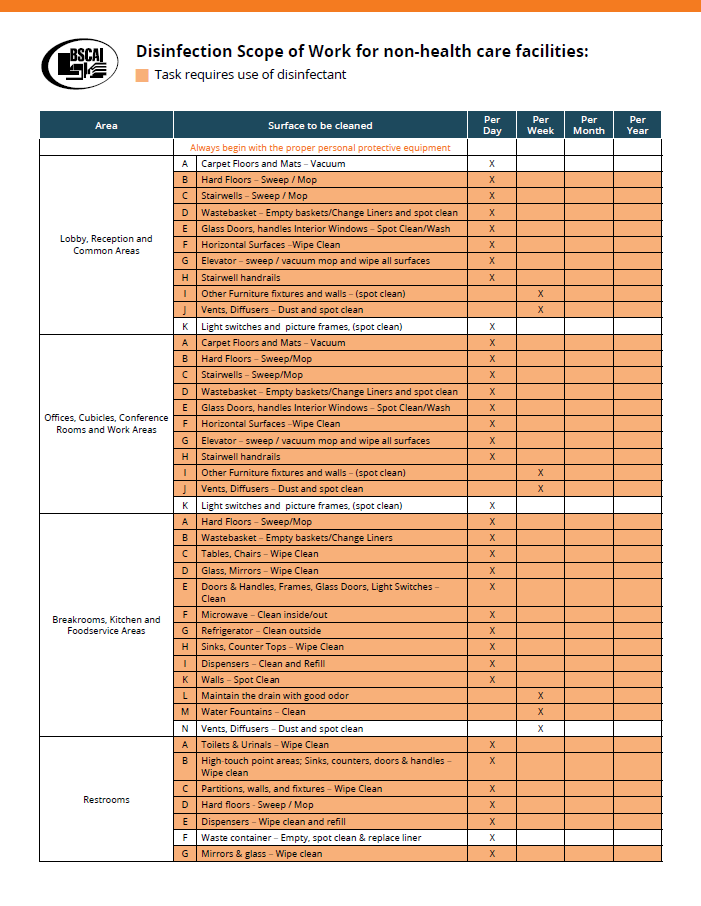
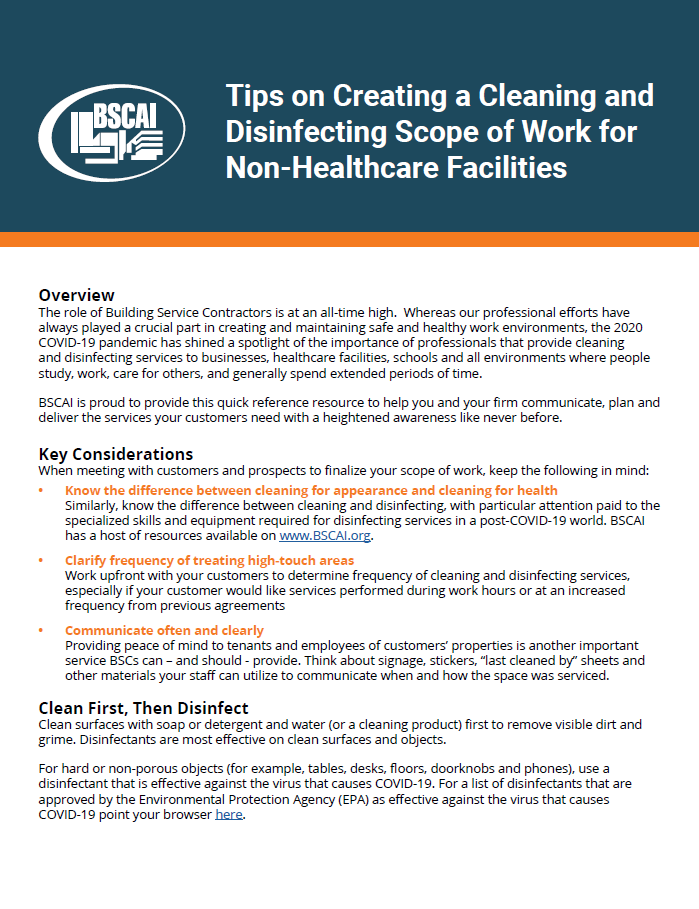
The role of Building Service Contractors is at an all-time high. Whereas our professional efforts have always played a crucial part in creating and maintaining safe and healthy work environments, the 2020 COVID-19 pandemic has shined a spotlight of the importance of professionals that provide cleaning and disinfecting services to businesses, healthcare facilities, schools and all environments where people study, work, care for others, and generally spend extended periods of time.
BSCAI is proud to provide this quick reference resource to help you and your firm communicate, plan and deliver the services your customers need with a heightened awareness like never before.
Download the Guide
Show Your Pride
The work you do is very important and necessary to keeping our buildings and communities safe. Cleaning is truly an essential part to the solution. Show your pride by updating your Facebook profile picture or using this custom Zoom background for your meetings.
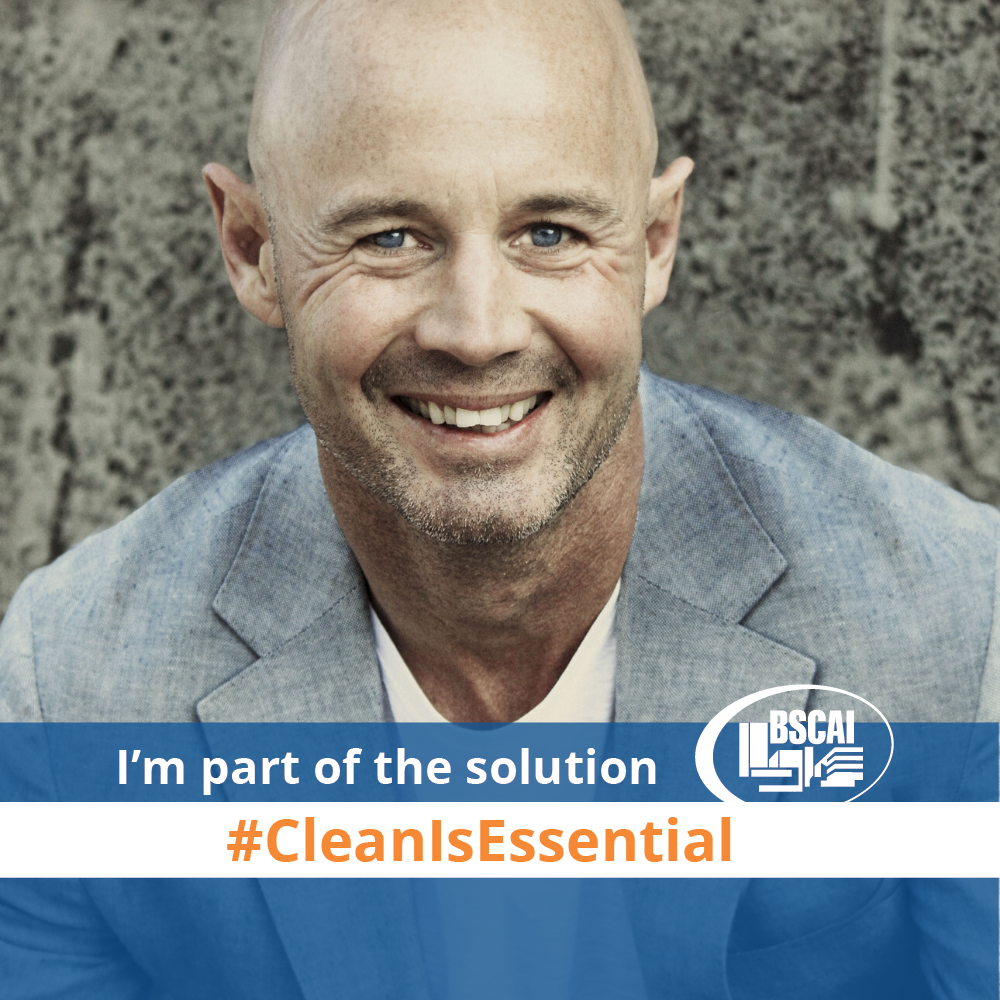 How to Use the Facebook Profile Frame
How to Use the Facebook Profile Frame
- Click here
- Search "Clean is Essential"
- Choose the BSCAI frame
- Click "use as profile picture"
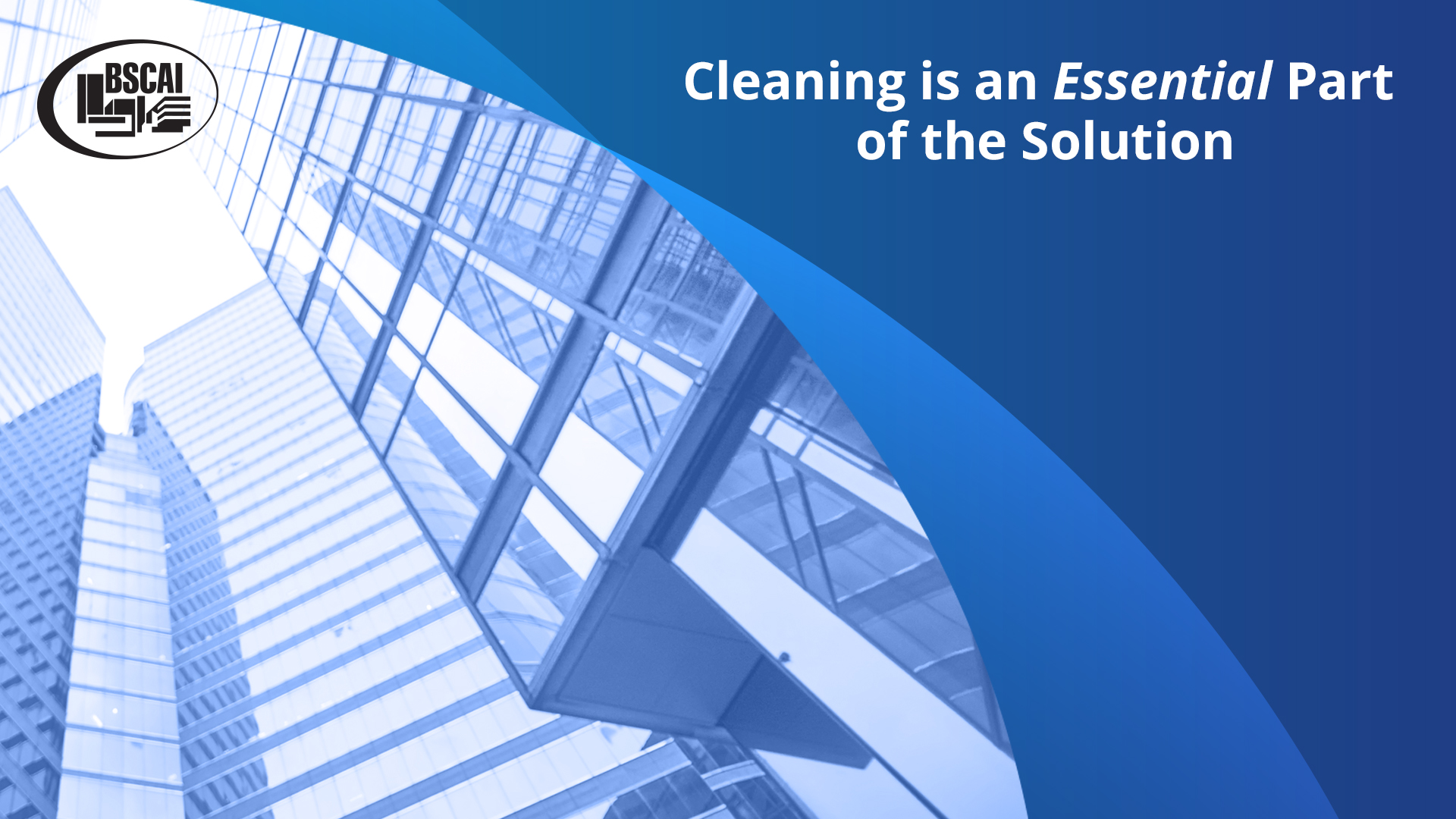 How to Use the Virtual Background
How to Use the Virtual Background
- Click here to download the image.
- Follow this easy how-to guide for adding this background to Zoom.
Diversey Electrostatic Spray (ESS) Application
Electrostatic sprayers (ESS) are increasingly being considered to apply disinfectants to hard nonporous surfaces. While potentially a useful tool, there are important technical considerations to their use. This document reviews a number of considerations and proposes an application method for ESS when used with Diversey disinfectants.
Download.
Government Resources
CDC Mask Guidelines
Stay up to date on CDC mask guidelines by checking out the CDC website.
COVID-19 Vaccines
OSHA Issues Emergency Temporary Standard on COVID-19 Vaccination and Testing: Vaccination or Testing Required for Employers with 100+ Employees by Jan. 4
On November 4, the Occupational Safety and Health Administration (OSHA) issued an Emergency Temporary Standard (ETS) on COVID-19 vaccination and testing which applies to employers with a total of 100 or more employees, firm or company-wide. As previously reported by BSCAI, the ETS requires employers to develop, implement, and enforce a mandatory COVID-19 vaccination policy, unless employers adopt a policy requiring employees to either get vaccinated or to undergo weekly COVID-19 testing and wear a face covering at work. Employers must ensure that their employees have received the necessary shots to be fully vaccinated or require weekly testing by Jan. 4, 2022.
The ETS requires employers to do the following:
- Determine Vaccination Status: All covered employers must determine the vaccination status of each employee, obtain acceptable proof of vaccination status from vaccinated employees and maintain records and a roster of each employee’s vaccination status.
- Vaccination Requirements: All covered employers must ensure that their employees have received the necessary shots to be fully vaccinated – either two doses of Pfizer or Moderna, or one dose of Johnson & Johnson – by January 4th.
- Testing Requirements: Ensure each worker who is not fully vaccinated is tested for COVID-19 at least weekly (if the worker is in the workplace at least once a week) or within 7 days before returning to work (if the worker is away from the workplace for a week or longer).
- Notification of Positive Test: Require employees to provide prompt notice when they test positive for COVID-19 or receive a COVID-19 diagnosis. Employers must then remove the employee from the workplace, regardless of vaccination status; employers must not allow them to return to work until they meet the required criteria.
- Paid Time Off Requirements: Employers must provide paid time off to workers to get vaccinated and to allow for paid leave to recover from any side effects.
- Mask Requirements: Ensure that, in most circumstances, each employee who has not been fully vaccinated wears a face covering when indoors or when occupying a vehicle with another person for work purposes.
Additional Details:
- The ETS does not apply to employees who work remotely from home, who work exclusively outdoors, or who do not report to a workplace where other individuals are present.
- The ETS does not require employers to pay for testing but employers may be required to pay for testing to comply with other laws, regulations, collective bargaining agreements, or other collectively negotiated agreements. Employers are also not required to pay for face coverings.
- The rule will be effective immediately upon its publication in the Federal Register tomorrow morning. Employers must comply with most ETS requirements within 30 days of publication (Dec. 5) and with testing requirements within 60 days of publication (Jan. 4).
BSCAI is continuing to review the almost 500-page ETS and will be providing members with more detailed information at a later date. Below you will find key details released by OSHA thus far.
OSHA ETS Information for Employers
For any questions, please contact BSCAI Director of Government Affairs Kevin McKenney at kmckenney@bscai.org.
COVID-19 Guidelines for Workplace Safety and Health
Click here to view OSHA's most up-to-date resources for COVID-19 guidance and regulations.
Cleaning Coalition of America (CCA)
BSCAI Joins Cleaning Coalition of America to Advocate for Essential Sector
BSCAI announced their involvement in the newly formed Cleaning Coalition of America (CCA). This partnership stems from BSCAI’s commitment to supporting BSC’s through the COVID-19 pandemic and beyond. Read the full press release.
Re-Opening
This jointly developed guidance from the Centers for Disease Control and Prevention (CDC) and the U.S. Environmental Protection Agency (EPA) is intended for all Americans, whether you own a business, run a school, or want to ensure the cleanliness and safety of your home. This plan is part of the larger United States Government plan and focuses on cleaning and disinfecting public spaces, workplaces, businesses, schools, and can also be applied to your home.
HR resources for re-entry, provided by Affinity HR Group
Request for Emergency Paid Leave
Click here to download a paid leave request form you can distribute to your employees for their use. Form provided by Affinity HR Group.
Coronavirus Aid Relief Economic Security (CARES) Act
The CARES Act tasks the Small Business Administration (SBA) with overseeing the distribution of millions of dollars in loans and grants to help small businesses survive the pandemic. It also provides additional funding for SBA’s Resource Partners to provide advice and training to help small businesses respond to the unprecedented challenges in communities throughout the country.
Below are resources to provide information and help understanding the act. For specific information and actions, we recommend you contact your bank or financial institution.
CARES Flow Chart
An Overview of the CARES Act webinar recording
Coronavirus Aid Relief Economic Security (CARES) Act breifing
Critical Federal Resources for Keeping Up with Coronavirus Updates
> Global Resources
> Domestic Resources
The Centers for Disease Control and Prevention (CDC) is closely monitoring an outbreak of respiratory illness caused by a novel (new) coronavirus first identified in Wuhan, Hubei Province, China. Chinese authorities identified the new coronavirus, which has resulted in thousands of confirmed cases in China, including cases outside Wuhan City. Additional cases have been identified in a growing number of other international locations, including the United States.
> Pesticide Registration
> What is the Coronavirus (COVID-19)?
2019 Novel Coronavirus (2019-nCoV) is a virus (more specifically, a coronavirus) identified as the cause of an outbreak of respiratory illness first detected in Wuhan, China. Early on, many of the patients in the outbreak in Wuhan, China reportedly had some link to a large seafood and animal market, suggesting animal-to-person spread. However, a growing number of patients reportedly have not had exposure to animal markets, indicating person-to-person spread is occurring. At this time, it’s unclear how easily or sustainably this virus is spreading between people.
How it Spreads
COVID-19 is thought to spread mainly through close contact from person-to-person. Some people without symptoms may be able to spread the virus. We are still learning about how the virus spreads and the severity of illness it causes.
The virus that causes COVID-19 is spreading very easily and sustainably between people. Information from the ongoing COVID-19 pandemic suggest that this virus is spreading more efficiently than influenza, but not as efficiently as measles, which is highly contagious.
Read the full CDC guidance on how Coronavirus is spreading.
Symptoms
Symptoms can include:
- Fever
- Cough
- Sore throat
- Shortness of breath
CDC believes at this time that symptoms of 2019-nCoV may appear in as few as 2 days or as long as 14 after exposure. This is based on what has been seen previously as the incubation period of MERS viruses.
Prevention
There is currently no vaccine to prevent 2019-nCoV infection. The best way to prevent infection is to avoid being exposed to this virus. However, as a reminder, CDC always recommends everyday preventive actions to help prevent the spread of respiratory viruses, including:
- Avoid close contact with people who are sick.
- Avoid touching your eyes, nose, and mouth with unwashed hands.
- Stay home when you are sick.
- Cover your cough or sneeze with a tissue, then throw the tissue in the trash.
- Clean and disinfect frequently touched objects and surfaces using a regular household cleaning spray or wipe.
- Follow CDC’s recommendations for using facemask.
- CDC does not recommend that people who are well wear facemask to protect themselves from respiratory viruses, including 2019-nCoV.
- Facemask should be used by people who show symptoms of 2019 novel coronavirus, in order to protect others from the risk of getting infected. The use of facemasks is also crucial for health workers and people who are taking care of someone in close settings (at home or in a health care facility).
- Wash your hands often with soap and water for at least 20 seconds, especially after going to the bathroom; before eating; and after blowing your nose, coughing, or sneezing.
- If soap and water are not readily available, use an alcohol-based hand sanitizer with at least 60% alcohol. Always wash hands with soap and water if hands are visibly dirty.
Treatment
There is no specific antiviral treatment recommended for 2019-nCoV infection. People infected with 2019-nCoV should receive supportive care to help relieve symptoms. For severe cases, treatment should include care to support vital organ functions.
People who think they may have been exposed to 2019-nCoV should contact your healthcare provider immediately.
Information gathered from https://www.cdc.gov/coronavirus/2019-ncov/about/index.html.
What Is An “Essential” Business?
Which businesses are “essential” is being determined at the state and local level. But most states and localities are turning to the essential critical infrastructure guidelines issued by the U.S. Department of Homeland Security for guidance.
BSCAI Statement on “Essential” Businesses and State-Specific Stay Home Orders (3/20/2020)
BSCAI "Essential" Workforce Guide
The U.S Department of Homeland Security Cybersecurity & Infrastructure Security Agency released the Memorandum on Identification of Essential Critical Infrastructure Workers During COVID-19 on March 19. It is important to note that this document is guidance for state and local governments and is non-binding. However, states will be looking to this guidance as they consider various stay-home orders. Refer to the following sections of this memorandum as they relate to BSC’s and the BSC industry.
- Page 10, under Information Technology, calls out, “Support required for the continuity of services, including janitorial/cleaning personnel.”
- Page 10, under Other Community-based government operations and essential functions, “workers to ensure continuity of building functions.”
- Page 10, under Other Community-based government operations and essential functions, “Security staff to maintain building access control and physical security measures.”
BSCAI will continue to monitor state-wide responses to COVID-19 and the associated allocation of “essential” workers.
Read the full press release.
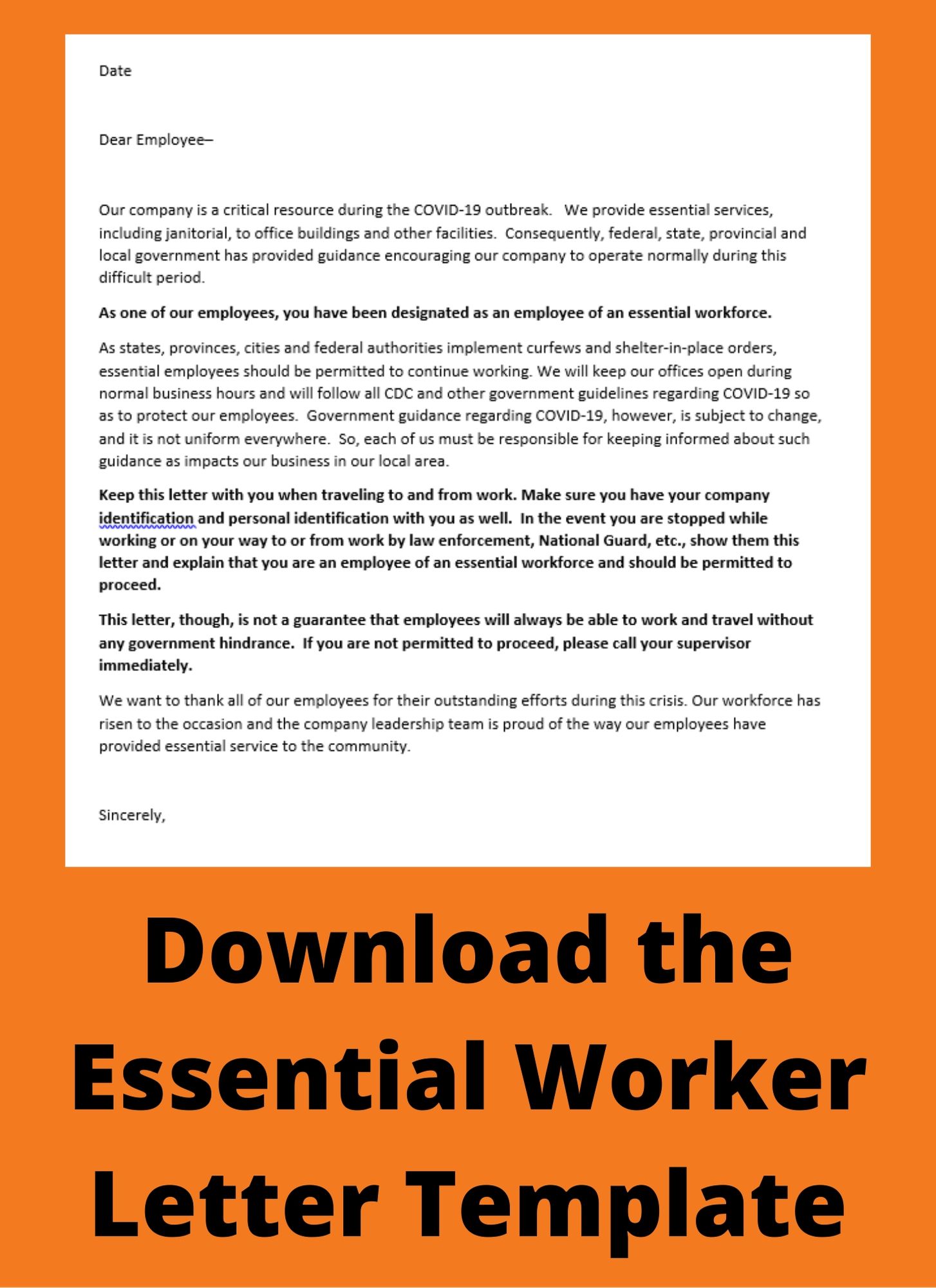 Essential Worker Letter Template
Essential Worker Letter Template
Click here to download a letter template that you can customize for your company and provide to your employees they can use to prove, if asked by law enforcement, to show that they work for an employer that is covered under “essential workforce.
Instructions:
- Review the letter and personalize it for your company. Use this as an opportunity to talk to your employees and tell them how important their jobs are, and how critical they are overcoming this crisis.
- Put this text on your company letterhead.
- Make sure that this letter is consistent with your state and local guidelines regarding “essential workforce.” If you are unsure, check the BSCAI COVID-19 Resource Center.
- If your employees have company-issued ID cards, please encourage them to carry it with them in addition to this letter.
- Distribute this letter to employees.
Expert Advice
Commercial cleaners should be diligent about tackling 2019-nCoV for their clients. BSCAI has compiled a list of commercial cleaning resources for coronavirus, which addresses best practice for cleaning companies. There are many things to consider during this time, including what your legal protections/obligations are and how to work out a cleaning schedule that works for both you and your client.
> Janitorial Staffing Resources
> Client Relations Resources
> Business Resources
> At-Home Cleaning Resources
Supplier Solutions
Several BSCAI partners have cleaning products designed to handle coronavirus infections. Please see below for more information about which of their products might best serve your needs.
- Actionable Hygiene Checklist